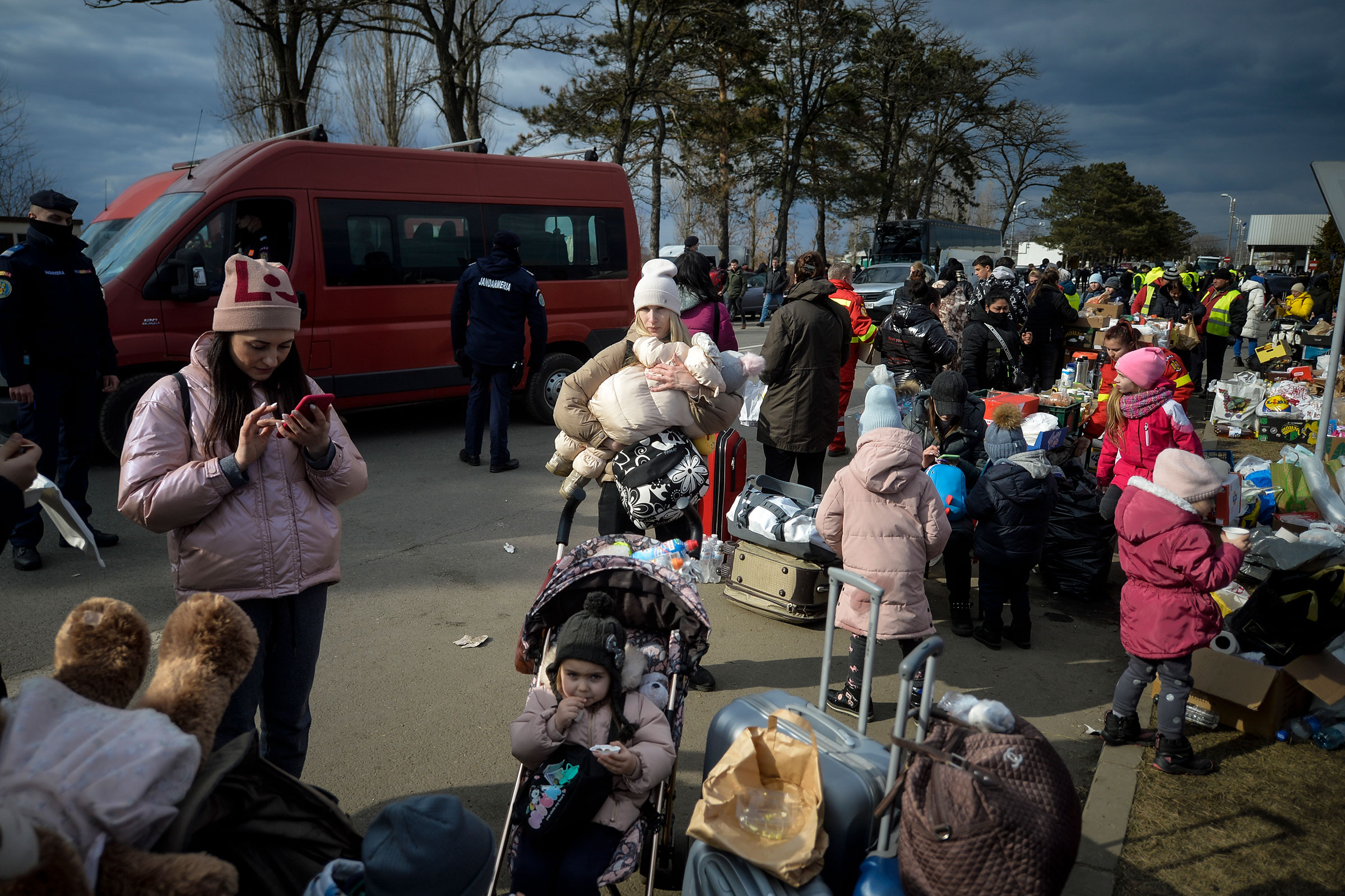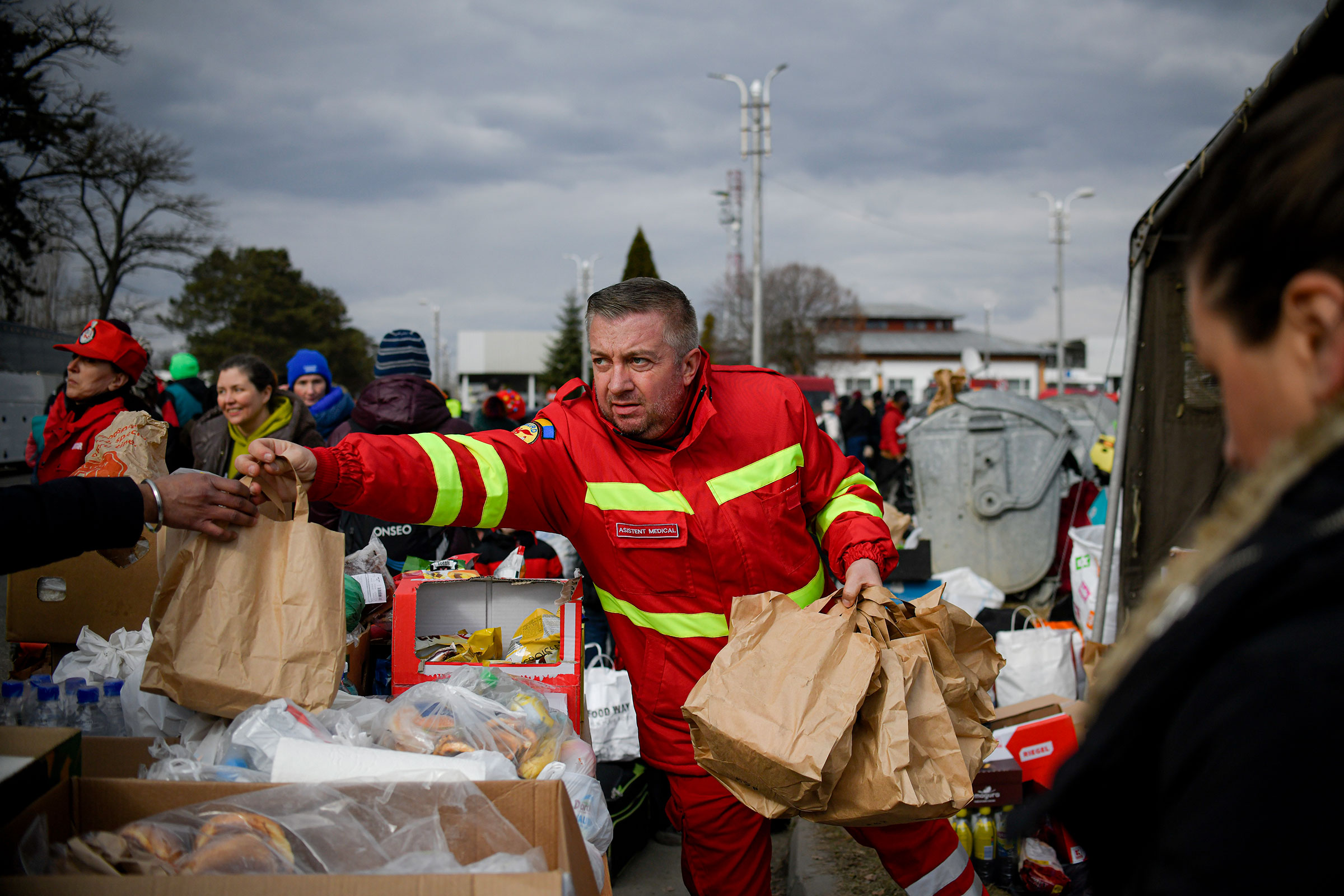The moment he heard that Russian tanks had entered Ukraine, Daniel Condurache jumped in his car and drove an hour to the Romanian border crossing at Siret. He wanted to offer refugees whatever help he could. “When I first got here it was the middle of the night and there were just three of us and some Orthodox priests helping to translate Ukrainian,” says Condurache, a real estate agent from Botoșani, Romania. “Putin is a criminal and these people don’t deserve this.”
Condurache may have been one of the first to arrive at Siret, but hundreds of his countrymen were close behind. Today, ordinary Romanians flank both sides of the dusty road leaving the border crossing, offering food, water and essentials like soap and diapers to Ukrainian refugees. Lawyers offer free advice on asylum procedures; others, like Condurache, offer transportation and shelter. “Now everybody’s uniting,” he says. “Romanian people are trying to help all over the country.”
Read More: Eastern Europe Opens Its Doors and Hearts to People Fleeing Ukraine
It’s an outpouring of compassion that’s all the more extraordinary given historically testy relations between these neighbors. Following World War II, the USSR annexed the area of Bessarabia from Romania and, somewhat controversially in these parts, it remains part of Ukraine today. That ethnic Romanians in Ukraine aren’t schooled in their native language is a source of constant concern. There’s also a dispute about ecological damage from Ukraine’s Bystroye Canal, which affects both sides of the border, as well as contested Snake Island in the resource-rich Black Sea, where the territorial limits of the surrounding continental shelf were only delineated by the International Court of Justice in 2009. (Snake Island was just the scene of a dramatic, foul-mouthed stand-off between Ukrainian and Russia troops.)
At the moment, though, all this has been forgotten in the face of Russia’s belligerence. “I never even thought of crossing the border to Ukraine or Moldova before, because in my head these places are Russian,” says Condurache. “But now I see these people arriving: this is not Russia.”

Putin’s tactics of divide and rule are well-documented. Torrents of Kremlin-backed fake news helped foment Britain’s withdrawal from the E.U. and get a polarizing reality television star elected president of the U.S. In two draft treaties that the Russian government published in December, Putin outlined how he sought to restore Moscow’s control over Ukraine and former Soviet territories; destroy the North American Treaty Organization (NATO) as an effective alliance; and reduce former Warsaw Pact or USSR countries that are now E.U. members to vassal status, whose security arrangements are the sole purview of the Kremlin.
In Romania, the outrageousness of these demands combined with Putin’s savagery in Ukraine has served to galvanize solidarity. “There has been a huge mobilization in support of Ukrainian refugees and Ukraine in general,” says Oana Popescu-Zamfir, director of the Bucharest-based Global Focus think tank.
Read More: Exodus Grows as Nearly 370,000 People Flee Russia’s Ukraine Invasion. Millions May Follow
This is reflected across Europe as tens of thousands have gathered to protest Russia’s actions and pressure their own governments into sterner action. On Sunday, the E.U. took the remarkable decision to ban Russian aircraft from its airspace. Russian banks have been cut out of the SWIFT monetary transfer system, while Germany has boosted its NATO contribution to 2% of GDP. The pressure of sanctions has seen the value of the ruble plummet by 40% against the dollar, prompting the Kremlin to spike interest rates from 9.5 to 20%. And at border crossings around Ukraine’s periphery, ordinary Slovakians, Hungarians, Moldavians and Poles have come out to welcome the influx.
It’s particularly significant since Ukraine’s western neighbors, such as Hungary and Slovakia, have consistently ranked among the least accepting in the world for migrants, and of them only Moldova voted for the U.N. migration pact in 2018. That said, while opening his borders to refugees, Hungarian’s strongman President Viktor Orbán has said he would not allow lethal weapons to be transferred to Ukrainian resistance through his territory.
Warnings of Russian Aggression Unheeded
Yet in Eastern Europe, there’s also a sense of irritation that Western European nations, especially Germany, France and Italy, which rely on Russian energy, dragged their heels on Putin’s aggression despite so many warning signs—not least his 2008 incursion into Georgia and the 2014 annexation of Crimea.
“There’s a widespread perception—not just in Romania but across Central Eastern Europe—that Western Europe did not take our warnings about Russian aggression seriously enough,” says Popescu-Zamfir. Too late, perhaps, but the threat of Putin’s Russia is no longer a matter of debate. For the first time ever Friday, NATO activated its Response Force consisting of land, air, sea and special operations, which can deploy quickly in support of the alliance. “I have never heard so many people say that it’s such a blessing for Romania to be a NATO member,” adds Popescu-Zamfir.
Read More: ‘We Will Defend Ourselves.’ Photographs of Ukraine Under Attack
The depth of support for the Ukrainian resistance is why many observers believe Putin agreed to have talks with a Ukrainian delegation at the border with Belarus, “without preconditions.” Yet many of the over 500,000 people who had fled Ukraine by Monday, according to the U.N., doubt whether a negotiated settlement is feasible and are planning to help their homeland with funds. Among them is Maria Menieva, 24, a choral conductor from the western Ukrainian city of Lyiv, who TIME met Sunday crossing into Siret with her violinist boyfriend and cocker spaniel, Gary. “We’re heading to Denmark to earn money to give to the Ukrainian army,” she says. “I have two brothers fighting and I’m so scared for them.”

Many from across Europe are prepared to help with more than just cash. On Sunday, Ukrainian President Volodymyr Zelenskyy announced the Ukrainian armed forces were setting up a foreign legion unit for international volunteers. In response, U.K. Foreign Secretary Liz Truss has said she supports Britons wanting to join up, telling the BBC that it was a battle “for democracy” and “not just for Ukraine but for the whole of Europe.” Sure enough, at the Siret border crossing, TIME observed two thick-set men with British accents and paramilitary dress conspiratorially discussing how best to cross over into Ukraine. (TIME was unable to confirm if their plan was indeed to join the fight against Russia.)
Voicu Muresanu, 26, a videographer from Romanian university city of Cluj, came to Siret to document the refugee exodus but has been so appalled by the suffering that he’s seriously thinking about picking up a gun. “Lots of my friends are researching how to join the Ukrainian army,” he says. “I don’t want to go there, I’m scared sh-tless, but I feel that if 5 million people did then this war would be over in two days.”
Others believe that it’s down to the West to teach Putin a lesson. “Europe and America should do more,” says Condurache. “[President Joe] Biden is a good guy but I think he should send soldiers. Putin is crazy, he is like Hitler, and will want more countries,” Condurache adds, gesturing to the lines of bedraggled women and children trundling past. “No normal person could bomb these guys like that.”
More Must-Reads from TIME
- Why Trump’s Message Worked on Latino Men
- What Trump’s Win Could Mean for Housing
- The 100 Must-Read Books of 2024
- Sleep Doctors Share the 1 Tip That’s Changed Their Lives
- Column: Let’s Bring Back Romance
- What It’s Like to Have Long COVID As a Kid
- FX’s Say Nothing Is the Must-Watch Political Thriller of 2024
- Merle Bombardieri Is Helping People Make the Baby Decision
Write to Charlie Campbell / Siret, Romania at charlie.campbell@time.com